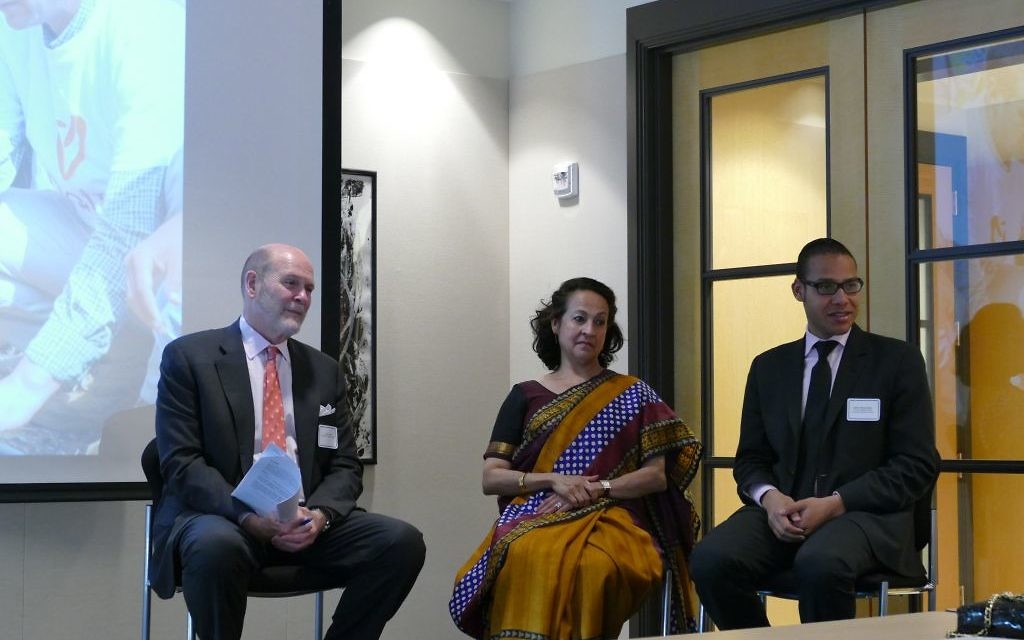India, Israel Celebrate Past, Future Relations
Bilateral relations between India and Israel continue to strengthen economic and cultural ties.

The bilateral relations between the nations of India and Israel go back 25 years, but the cultural ties run much deeper.
“The connection between India and Israel is based on shared values and democracy between two ancient countries who also share a mutual interest in security and globalization within their societies and communities,” Indian Consul General Nagesh Singh said. “The relationship may be 25 years old, but the bond is much older.”
To highlight 25 years of endeavors between the two democracies, the Israeli Consulate General, Asian American Heritage Foundation, Metro Atlanta Chamber, Conexx and American Jewish Committee hosted the first India Israel US Forum on Monday, April 24, at the offices of Arnall Golden Gregory at Atlantic Station.
Get The AJT Newsletter by email and never miss our top stories Free Sign Up
Maina Chawla Singh, a scholar in residence at American University’s School of International Service, said more than 35,000 Israelis a year visit India, most going there after their military service. The adventurous hike in the mountains; those seeking a more relaxed vibe go to Goa.
The presence of Israeli backpackers and tourists is so strong in some areas that cafes in India offer traditional Israeli cuisine, former Israeli soldiers get discounts and guest houses welcome visitors in Hebrew.
Even though the Israelis usually aren’t religious, Singh said, the Chabad houses are packed on Shabbat.
She said most Indian Jews made aliyah between 1950 to 1960, “yet there was no rush to leave, as there was no history of anti-Semitism. Most waited to hear about Israel first before resettling, while others were wooed by various agencies targeting low- and middle-class families.”
She lived in Israel while her husband, Arun Singh, was ambassador to Israel, and welcomed Israeli Indians to India Day festivities. “When I asked the guests why they chose to live in Israel, I was often told, ‘We are not Mizrahi Jews, but Indian Jews, and while you can take a Jew out of India, you can’t take India out of Jew. India will always be our motherland, and Israel will remain our fatherland.’ ”
Indian-Israeli ties in diplomacy and security have been boosted by the first presidential visits between the countries, with India’s Pranab Mukherjee going to Israel in 2015 and Israel’s Reuven Rivlin going to India in 2016.
Ambassador Judith Varnai Shorer, the Israeli consul general to the Southeast, said she hopes the ever-stronger relations between India and Israel “will bring more young Indians to Israel and continue building our strength with India.”
Shimon Mercer-Wood, who handles media affairs for the Israeli Consulate General in New York, discussed growing partnerships between Israel and India in defense, trade, investment and agriculture.
Farms set up in India as centers of excellence through Mashav, Israel’s agency for international development, have had a profound impact by training Indian farmers to cultivate sustainable and diverse crops, Mercer-Wood said, but the project is not an Israeli handout.
“We don’t see it as aid to India but a partnership between Mashav and India, which provides most of the funding. It’s a collaborative process to produce high-value crops on small land, such as vegetables and mangos,” he said.
Fourteen Israeli agricultural experts are based in India, with training and workshops set up in both countries, Mercer-Wood said. “The relationship is perhaps just as important as defense because it touches on society, and Israeli experts also learn from other communities, which is part of the reason Israel has become so advanced in agriculture globally.”
In addition to initiatives on recycling water, enterprises are being organized toward a dairy farm while maintaining sensitivity to India’s customs. Mercer-Wood also said it is important for the United States to participate in a trilateral relationship to expand projects.
A panel consisting of Conexx President Guy Tessler, Metro Atlanta Chamber Vice President Jorge Fernandez and event co-chair Ani Agnihotri discussed the role of Georgia and the Southeast in that three-way relationship.
Tessler said 55 Israeli companies are represented in Georgia, encouraged by business missions to Israel in 2014 with Gov. Nathan Deal and in 2015 with Atlanta Mayor Kasim Reed. Those connections helped Israeli company Energiya Global learn about an opprtunity and eventually win in the bidding for a solar field in Brunswick, Georgia.
Georgia imports from Israel totaled $437.7 million in 2015, Tessler said, led by medical equipment, aviation and heavy machinery.
But Agnihotri, the program chair for the USA India Business Summit, said: “We are still finding it hard to reel in Fortune 500 companies, as they opt for Los Angeles, New York or Chicago by default. We have also failed to take state representatives to India to gain more traction. On the other hand, India’s billion-dollar Bollywood movies may be good for Atlanta’s film industry.”
While Israel is known as the Start-Up Nation, Atlanta is still not seen as a place to do business, Fernandez said, so “we changed our strategy and began focusing on what areas we excel in, where our partners lie across the world and where cities share commonalities in terms of economic engines. By focusing on areas where we have a critical mass, such as governments, communities and organizations, we create win-win situations.”

One strength for Atlanta is financial technology, leading to 70 percent of U.S. financial transactions being processed through the metro area, Fernandez said. The second annual Atlanta-Israel FinTech Innovation Conference will take place May 22 and 23 at Greenberg Traurig.
“The pull of Atlanta is different; it contains a spirit of entrepreneurship,” Tessler said. “We should focus on sharing that story and staying connected.”




comments